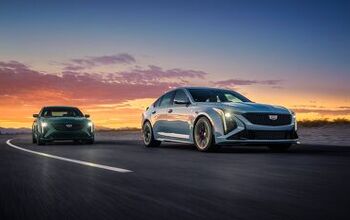Study Suggests Diesel Cars Killed 38,000 Extra People Without Even Hitting Them

Earlier today, we mentioned Volvo was preparing to dump its diesel-burning engines because the EU is aggressively pursuing anti-diesel legislation. While it’s easy to accuse Europe of being fraught with fringe environmentalists, the truth is that the continent spent decades avoiding restrictions on diesel-burning passenger vehicles, sold loads of them, and has suddenly found itself with its green pants around its ankles.
In addition to hazy skies, air pollution isn’t exactly great for your health. A recent study published in Nature found diesel engines produced 5 million more tons of nitrogen oxide than previously estimated for 2015. The research focused on vehicles in Australia, Brazil, Canada, China, the European Union, India, Japan, Mexico, Russia, South Korea and the United States and uncovered that we’ve grossly overestimated the amount of good being done by our global regulatory efforts. Companies are practically guaranteed to be falsifying testing results while others are openly incapable of reaching government-enforced guidelines.
Who cares? It’s not like anyone is dying, right? Well, not exactly.
Keen to adhere some urgency to the findings, the researches estimated the added 5 million tons of NOx contributed to about 38,000 more premature deaths in 2015 than previous estimates.
Thanks to a lower population density and overall higher quality of air, only about 1,100 of those deaths were from North America. Meanwhile, China, India and the European Union took the brunt of the representative corpses. The EU found itself with a disproportionately large number of NOx related health issues compared to some more populous regions. The same is true when you break it down into countries. The European Environment Agency surmises the United Kingdom actually sees a few thousand more diesel emission-related deaths than Germany each year, despite possessing a significantly smaller population. Italy, which is even smaller than the UK, has almost twice the death-rate of Deutschland.
Hans Bruyninckx, the EEA’s executive director, stated in 2016: “Emission reductions have led to improvements in air quality in Europe, but not enough to avoid unacceptable damage to human health and the environment.”
The authors of the Nature study used real-world analysis to determine “nearly one-third of on-road heavy-duty diesel vehicle emissions and over half of on-road light-duty diesel vehicle emissions are in excess of certification limits.”
The researchers insist adopting and enforcing next-generation standards, specifically something more aggressive than Euro 6, could virtually eliminate diesel-related NOx emissions in these at-risk regions. While it’s difficult to quantify pollution specific fatalities — even though that’s what a good portion of the study is devoted to — its findings estimate 174,000 premature deaths could be prevented in 2040 by applying stringent standards to heavier-duty vehicles and shifting passenger cars away from diesel entirely.
Some might assume if automakers can’t best the current emissions standards without cutting corners today, there’s no way they’ll be able meet the more rigorous guidelines of tomorrow. However, the authors cited recent tests that proved “real-world NOx emissions in line with certification limits are technically achievable.”
Ray Minjares, from the U.S. International Council on Clean Transportation, was consulted as part of the research team.
“Manufacturers know how to make their cars clean and they are actively choosing not to,” he stated. “The question for the public is: are we comfortable with that situation? Why are manufacturers who sell vehicles in Europe choosing to provide Europe with dirtier versions of the cars they sell in the U.S.?”

A staunch consumer advocate tracking industry trends and regulation. Before joining TTAC, Matt spent a decade working for marketing and research firms based in NYC. Clients included several of the world’s largest automakers, global tire brands, and aftermarket part suppliers. Dissatisfied with the corporate world and resentful of having to wear suits everyday, he pivoted to writing about cars. Since then, that man has become an ardent supporter of the right-to-repair movement, been interviewed on the auto industry by national radio broadcasts, driven more rental cars than anyone ever should, participated in amateur rallying events, and received the requisite minimum training as sanctioned by the SCCA. Handy with a wrench, Matt grew up surrounded by Detroit auto workers and managed to get a pizza delivery job before he was legally eligible. He later found himself driving box trucks through Manhattan, guaranteeing future sympathy for actual truckers. He continues to conduct research pertaining to the automotive sector as an independent contractor and has since moved back to his native Michigan, closer to where the cars are born. A contrarian, Matt claims to prefer understeer — stating that front and all-wheel drive vehicles cater best to his driving style.
More by Matt Posky
Latest Car Reviews
Read moreLatest Product Reviews
Read moreRecent Comments
- Doc423 It's a flat turn, not banked, which makes it more difficult to negotiate, especially if you're travelling a little too fast.
- Jeff “So, the majority of our products are either ICE vehicles or intended to utilize those multi-energy platforms that we have. This is a great opportunity for us, compared to our peers, having the multi-energy platforms for all of our products in development and having the agility to move between them,” she said. From what is stated about the next generation Charger it will be released as a 2 door EV and then as a 4 door with the Hurricane turbo straight 6. I assume both the 2 door and 4 door is on the same platform.
- Brendan Duddy soon we'll see lawyers advertising big payout$ after getting injured by a 'rogue' vehicle
- Zerofoo @VoGhost - The earth is in a 12,000 year long warming cycle. Before that most of North America was covered by a glacier 2 miles thick in some places. Where did that glacier go? Industrial CO2 emissions didn't cause the melt. Climate change frauds have done a masterful job correlating .04% of our atmosphere with a 12,000 year warming trend and then blaming human industrial activity for something that long predates those human activities. Human caused climate change is a lie.
- Probert They already have hybrids, but these won't ever be them as they are built on the modular E-GMP skateboard.


































Comments
Join the conversation
Trump #Triggered
I stopped reading at "Study Suggests".